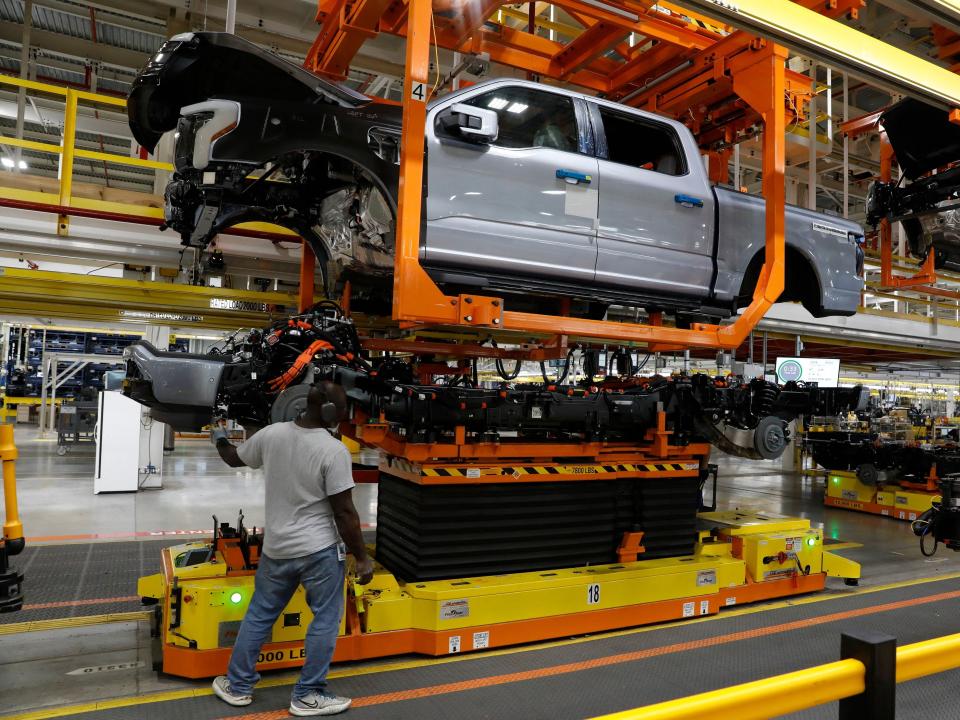It's not just the chip shortage — other supply chain disruptions are wreaking havoc on automakers and helping keep prices high

Automakers keep experiencing production challenges.
The pandemic, the shift to EVs, and supply chain problems are all to blame.
But all of that could continue to impact car buyers, experts say.
Automakers keep experiencing production challenges — and these days, it's not necessarily due to a shortage of chips. Not only does that mean car-buying is never going back to normal, there could be other impacts on consumers in terms of cost, too.
Ford earlier this month stopped production of F-150 Lightning electric pickups as it struggles with the transition to electric vehicles and a battery fire. Meanwhile, the auto giant also saw downtime at its factory in Louisville for the Ford Escape, related to a software issue. GM's Bowling Green plant will stop Corvette output this week due to a "parts supply issue." Toyota has planned to halt its Czech plant.
That's just in the past few weeks.
"When popular models such as these have their production interrupted," Sam Fiorani, vice president of global vehicle forecasting at AutoForecast Solutions, told Insider via email, "it demonstrates a larger issue in the supply chain that needs to be addressed rather than working as if this is just part of normal operations."
A larger issue is looming, indeed. Despite tailwinds like huge profits, high demand, and low inventory, automakers are bracing themselves for more disruptions.
Whether those constraints are residual impacts from the pandemic, newfound parts shortages, or issues shifting to an all-electric vehicle lineup, car companies and their parts-makers are navigating an impressive set of challenges.
What's giving automakers a hard time?
As expected, new industry entrants like Rivian have also halted production. This can, in part, be attributed to the fact that these companies don't have the same supplier relationships as their legacy competitors.
"With a vehicle that has hundreds of suppliers and thousands of components coming from those suppliers, it only takes one part from one supplier to stop the line," Rivian CEO RJ Scaringe said in a Q3 earnings call. He mentioned losing 5 days of production "because of a single component supply shortage."
The EV transition is just one of the industry's challenges.
"It's a whole new supply chain. It's a whole different source of product," Marcus Sprow, partner at firm Foley & Lardner and co-lead of its electrified mobility group. "There is a certain learning curve there."
But the shift to EVs isn't everything
There are a lot of other dynamics to keep an eye on. The relationship between automakers and their parts companies has never been perfect, but it's especially challenging of late even as the two remain codependent.
As automakers cashed in on pandemic-induced vehicle demand that left all sorts of markups on new and used vehicles, a lot of that profit didn't make its way to suppliers, experts say.
Now, parts companies are struggling amid macroeconomic concerns, inflation, in addition to the transition to EV components (or risking becoming defunct), and that will impact the automakers they supply to.
"A lot of suppliers are very, very stretched," Ambrose Conroy, CEO at consultancy Seraph, said. If auto giants, especially those focused on high-end, luxury products, don't have enough cash to bail their parts-makers out and keep them solvent, "we're expecting a lot of financial distress," he said.
"But when that can't happen, the supplier will normally end up going bankrupt," Conroy added. "It means things have to be resourced, prices will go up and it's a very painful exercise."
And, if automakers lose their parts, "generally, it adds more inflationary pressures to consumers," Conroy said, especially as they'll have to put more money into the supply base.
"They're going to take that money away from shareholder dividends and share buybacks," he added, "but it's also going to fuel the inflationary fires even more."
Read the original article on Business Insider

 Yahoo Autos
Yahoo Autos 